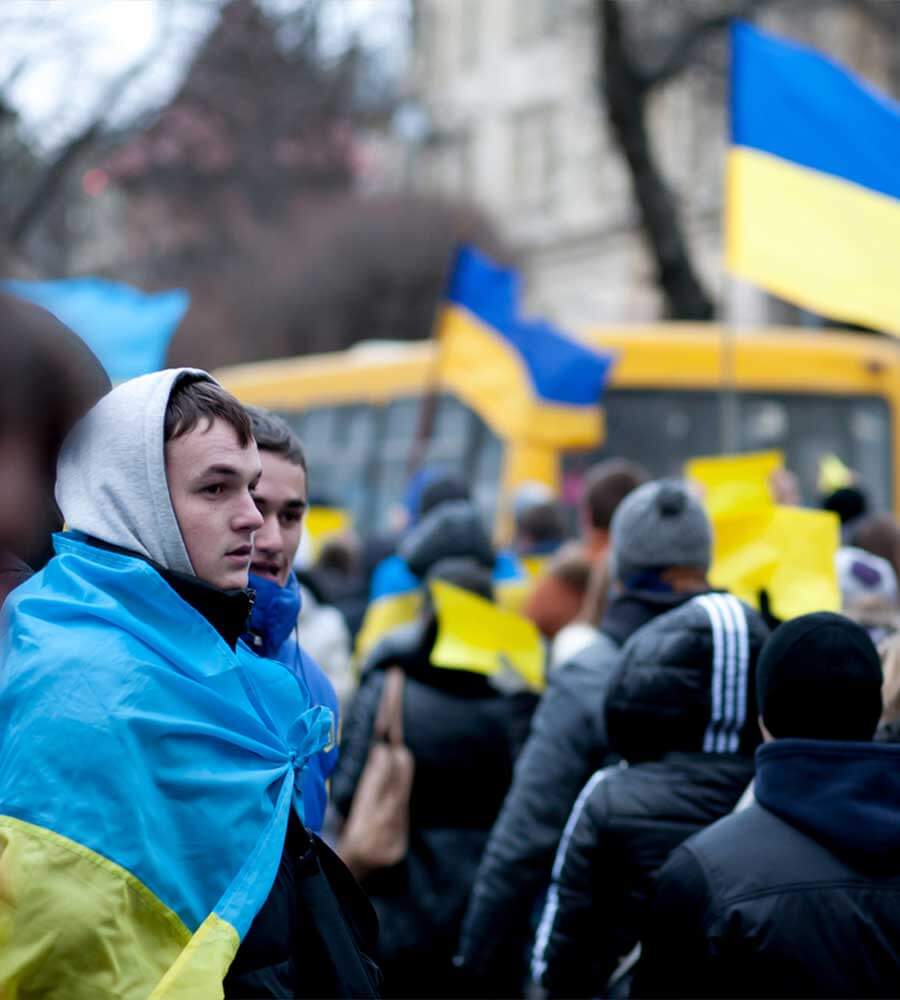Our work in Ukraine
Real peace begins with community unification, not political compromise
Ukraine faces an unimaginable humanitarian crisis as Russia’s full-scale invasion enters its fourth year.
Image: Ukrainian students attending pro EU manifestation in the city center in Lviv, Ukraine

From crisis to collective action in Ukraine
The ongoing campaign of terror has taken thousands of civilian lives and caused large-scale destruction. Putin’s regime shows no remorse for its deadly aggression as it uproots millions of people from their homes and targets communities, such as Roma people, women, people with disabilities, LGBTQ+ individuals, and Black refugees.
Yet, in the midst of social upheaval and political chaos, our grassroots partners are leading efforts to share resources and protect one another. When governments fail to safeguard people’s lives, we must take action with individuals affected by war and conflict. You can support our solidarity efforts by helping to amplify their voices and support community-led solutions, advancing human rights for all people in Ukraine.
The history
When Putin launched his unprovoked invasion on February 23, 2022, UUSC was already positioned to act, drawing on more than 80 years of experience supporting displaced communities and advancing collective liberation worldwide. Our President, Rev. Mary Katherine Morn stated, “All powerful states must be held accountable to the principles of human rights,” and since then we have continued to raise the alarm on how militarism and imperial violence have caused global suffering. We were founded to resist genocide and knew that we could not just sit back and witness compounding forms of oppression being inflicted upon communities without responding tot these injustices.
Thanks to our Emergency Response Fund, we were able to meet immediate needs, including food, clothing, shelter, and mental health support, by partnering with 10 grassroots organizations in Poland and Ukraine. In 2023, UUSC staff journeyed across Europe to gain a deeper understanding of their lived experiences and witness the challenges they faced. This in-person relationship building made clear that our partners are not just service providers, but rather movement builders fighting for systemic change while meeting immediate survival needs.
In 2024, our board and staff traveled to Eastern Europe to be alongside the very people pushing for liberation on the ground. This was a moment for us as a global community to not only respond to the humanitarian crises unfolding, but to understand and learn from leaders. We visited community centers transformed into sanctuaries, spaces where acts of gardening, art, and counseling were offered as means of healing and defiance. We saw firsthand how our partners grounded their work in reimagining the systems that had contributed to this crisis in the first place. And what they ask of us is not charity, but rather lasting partnerships grounded in trust and sovereignty.
Collective compassion amidst war
Our partners persist and ensure their essential work is not deterred by escalating dangers. While the Trump administration is open to talks with Putin’s regime for territorial control, we acknowledge that sustained peace cannot be imposed from above; it must emerge from communities most affected by violence.
UUSC partner highlights:
- Chiricli supports Roma women, elders, and people with disabilities by offering job training, education access, and emergency aid — leading to improved socio-economic conditions for people
- In Poland, Martynka runs a 24/7 hotline for Ukrainian women survivors of sexual violence while centering feminist care
- Towards Dialogue serves Ukrainian Roma refugees
- Alliance for Black Justice in Poland supports displaced Black communities
- Queer Svit advances LGBTQ+ rights and safety
- RegenerAction provides trauma support to frontline advocates
Together, they show that real peace means justice for all.
Support community-led response
Your gift delivers vital resources directly to grassroots organizations leading the way through a crisis — providing care, protecting rights, and organizing for long-term change.